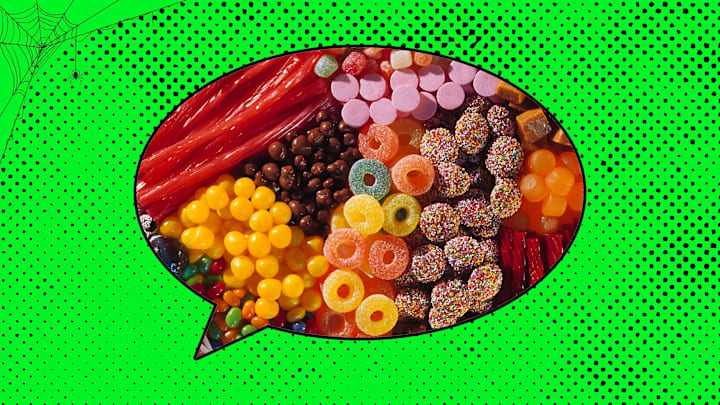History is filled with fun words to describe snacks that tickle your sweet tooth. Gear up for Halloween with 10 of the most inventive and evocative treat alternatives, from lulibub to fart.
1. Lulibub
The early 18th-century term lulibob didn’t quite catch on as well as its synonym lollipop, which arose several decades later. At that time, lollipops could be any sugary (or treacly) sweets meant to dissolve in your mouth, or even sweets of any kind, so it stands to reason that lulibob also may not have only referred to the stick variety we know and love today.
2. Suckabob

A character in James Payn’s 1888 novel The Mystery of Mirbridge mentions suckabob as an alternative to lollipop, though the Oxford English Dictionary labels this one “rare.”
3. Junkery
A good four centuries or so before we started calling treats “junk food,” people knew them as junkets or junkery. The 16th-century terms may be related to earlier words that had to do with a particular type of soft cheese, but the etymological trajectory is pretty murky.
4. Trinket
Trinket first appeared in writing during the 1520s, and people started using it in relation to dainty finger foods toward the end of that century. It’s not clear where the word originated, but one theory is that it’s linked to trick—a one-time synonym of trinket in the “little knick-knack or toy” sense. If that’s true, it’s not too hard to imagine an alternate universe in which trick also means treat, and neighborhood streets are filled with cries of “Trick or trick!” every Halloween.
5. Soot-meat
To the 21st-century mind, soot-meat evokes visions of charred beef at best—not exactly what you’d want in a bakery display. It makes much more sense in its 16th-century context, when soot could mean sweet and meat could mean food. Soot-meat is a direct synonym of the more popular sweetmeat, which was coined earlier and remained common well into the 19th century.
6. Pionade

An early 14th-century confectionery spread might feature a few pionades, a sweetmeat thought to be made with peony seeds. (Not to be confused with pinionade, which contained pine nuts.)
7. Nutty
British Navy members began using nutty seemingly circa World War II to refer to sweets—specifically chocolate, though not necessarily with nuts in it—often sent in care packages from home. Writer and World War II naval officer Charles Causley immortalized the term in the penultimate stanza of his poem “The Song of the Dying Gunner AA1”:
“Don’t send me a parcel at Christmas time
Of socks and nutty and wine
And don’t depend on a long weekend
By the Great Western Railway line.”
8. Mignardise
At least as far back as 1603, per the OED, English speakers were borrowing the French word mignardise to describe their own “affected delicacy of behavior or appearance.” Early 20th-century Americans then co-opted it for culinary delicacies—the bite-sized froufrou kind rolled out for dessert. Think petit fours, just with an even more affected title.
9. Sugarallie

Licorice in Scotland was once called sugar alicreesh (and several similar iterations), which evolved into the snappier sugarallie by the early 1800s. If licorice is a little too chewy for your taste, you might enjoy the Scottish concoction known as sugarallie water: literally licorice sticks dissolved in water. Recipes for this DIY soft drink vary; some people left the jug alone for a day or two and let the sugarallie disintegrate on its own, while others expedited the process by just shaking the container really hard.
10. Fart
By far the award for most off-putting archaic term for a type of treat goes to fart: “a small, baked confection with a sweet spiced filling and a crisp pastry case, typically served as a delicacy at feasts” dating back to 1480, according to the OED.
